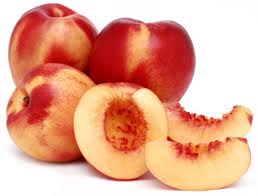 The nectarine, a small tree native to China, is known as a naturally occurring peach varietal. Cultivated for over 4,000 years, the nectarines was a popular fruit over the centuries which served as a symbol of long life in ancient China. Due to its sweet and floral taste, the nectarine became quite popular in Europe and North America since the seeds were easy to carry and sow in distant lands.
The nectarine, a small tree native to China, is known as a naturally occurring peach varietal. Cultivated for over 4,000 years, the nectarines was a popular fruit over the centuries which served as a symbol of long life in ancient China. Due to its sweet and floral taste, the nectarine became quite popular in Europe and North America since the seeds were easy to carry and sow in distant lands.
Nectarines are essentially peaches without the fuzzy outer skin. Instead of being cultivated by man, nectarines grew from a natural mutation, and are known to randomly grow wherever peach trees were grown. From China, the nectarine made its way to Europe, where historical figures such as Pliny were known to write about its wonderful traits. When the Spaniards brought peaches to the New World, they inadvertently brought the nectarine as well, with the fruit naturally developing quickly in its new environment. From the early 16th century roots, the nectarine has remained an important fruit in North America.
Key Nutrients
Nectarines a great source of flavonoids, potassium and carotene. Nectarines are also a great source of dietary fiber and are low in both saturated and unsaturated fat.
Health Benefits
Potassium – Potassium is an essential mineral which aids in fluid regulation, protein synthesis and cardiovascular health. High levels of potassium are associated with reduced risk for stroke, improved blood pressure control as well as bone health.
Beta Carotene – Beta carotene has been well-studied as a dietary antioxidant. Carotenoids are also thought to benefit eye health. Some studies support a role of carotenoids in reducing macular degeneration.
Flavonoids – Flavonoids are a class of antioxidants which help to promote healthy cell growth and reduce inflammation. They are also a powerful class of molecules when it comes to reducing the risk of certain cancers.
Season
Nectarines can be found in season during the summer months.
Nutrition Information
Per 1 Fruit (142 grams):
Calories (cKal): 62
Protein (grams): 1.51
Total Fat (grams): .45
Carbohydrates (grams): 14.98
Fiber (grams): 2.4
Buying and Storing
When buying nectarines, make sure the fruit is soft to the touch and free of blemishes. When storing at home, make sure to store in your refrigerator for up to five days if needed.
Best Way to Add to Diet
Nectarines make a great afternoon snack when you do not have a lot of time to take a break. They also make a great addition to any duck recipe, breakfast cereal and smoothie.
Nectarine Recipe

 Not Sure What Healthy Foods To Eat?
Not Sure What Healthy Foods To Eat? This week we take a look at one of my favorite healthy foods...the mighty Avocado.
This week we take a look at one of my favorite healthy foods...the mighty Avocado.
No comments yet.